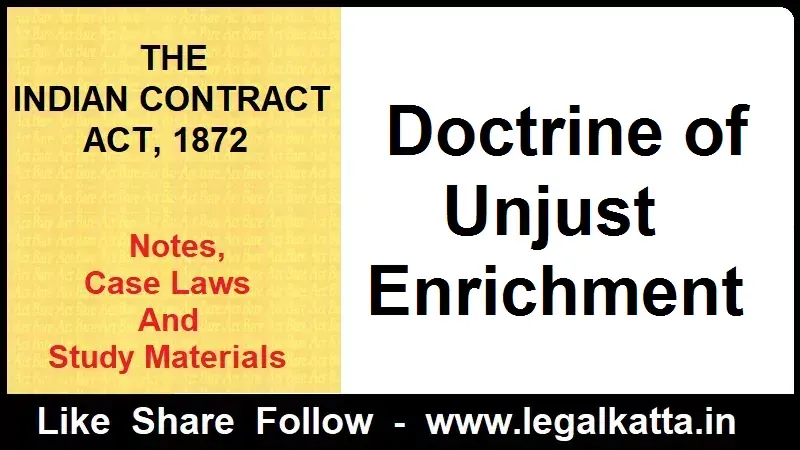Doctrine of Unjust Enrichment is stated as to when a person obtained a benefit from another person, nor intended as a gift and not legally justifiable, for which must the beneficiary make some restitution or recompense.
This doctrine of unjust enrichment may occur in the contract when one of the contracting parties performs his obligations but the other one does not perform his obligations. Then this doctrine is made applicable.
Theory of unjust enrichment has come from English Law in the 18th century.
Unjust Enrichment Meaning
Unjust enrichment meaning, in this, what is unjust means? So the unjust is defined as something that is not in accordance with the accepted standards of fairness or justice and which is also unfair.
What is enrichment means? So the enrichment means when a person obtains some benefit from another person then is it said to be the person is enriched.
According to Black's Law Dictionary, unjust enrichment means:
- The holding of a benefit received from another, without offering any compensation to him, in these circumstances where compensation is reasonably expected.
- A benefit obtained from the other, not intended as a gift and not legally justifiable for which the beneficiary must make compensation to the other party.
- The area of law deals with unjustifiable benefits of this kind.
What is Unjust Enrichment?
What is unjust enrichment means, "When a person unjustly enriched the other person at the cost of another is required to make restitution to the other person."
In other words, when a
person gained some benefit from the other person and thereby causing some loss
to another person, then the person who has gained the benefit out of this is
required to reimburse (to repay/return) the equal to the amount of benefit received
by the defendant to the plaintiff.
Therefore, we can say that unjust enrichment is based upon the important ingredients as;
- Benefit on one of the parties to the contract,
- At the cost of the other party,
- The party who gets the benefit is made liable to compensate for the losses caused to another.
Here, the unjust enrichment is different from the gift, as the gift is given without any reasonable expectation of receiving any consideration back. But in unjust enrichment, the party is expecting something in return. This is the difference between unjust enrichment and gift.
Principle of Unjust Enrichment
Principle of unjust enrichment is best on two things Gift and Choice which helps the party to refine the circumstances under which a plaintiff cannot bring a claim of unjust enrichment.
1. Gift Principle
In this principle, if the plaintiff had given some gift to the defendant and later cannot sue the defendant under unjust enrichment for not giving a gift back.
2. Choice Principle
The plaintiff cannot get a benefit upon the defendant without giving the defendant a choice to accept or reject the benefit, and then expect something in return from the defendant
Theory of Unjust Enrichment
Theory of unjust enrichment states that a party to the contract who has been unjustly enriched (illegally obtained) benefits at the cost of the other contracting party is to be made mandatory to compensate the other party to the extent of enrichment.
Unjust Enrichment Case Law
In Govindram Gordhandas Seksaria v. the State of Gondal, the party had agreed to purchase certain mills, he was allowed to recover the amount of already overdue municipal taxes paid from the seller to save the property from being sold at the auction.
In Dakshina Mohun Roy v. Saroda Mohun Roy Chowdhry, the Court held that money was paid by a person while in possession of an estate under the decree of the court for preventing the sale of the estate for recovering the arrears of government revenue may be recovered by him under this section.
Conclusion
Doctrine of unjust enrichment means that if one of the parties to the contract obtained the benefit out of the cost and expenses of the other party then the party has to make compensation to the other party to the extent of enrichment.
- Law of Contract - Bare Act 2021 Edition Professional
- The Indian Contract Act 1872 Bare Act 2021 Edition
- Law of Contract & Specific Relief Dr Avtar Singh Latest Edition-2020
- Pollock & Mulla - The Indian Contract Act, 1872
- CONTRACT Paper I - By R.K. Bangia [Edtion 2019 - 2020]
- CONTRACT Paper-II - By R. K. Bangia
- NOTES ON INDIAN CONTRACT ACT 1872: BEST NOTES FOR LAW STUDENTS

